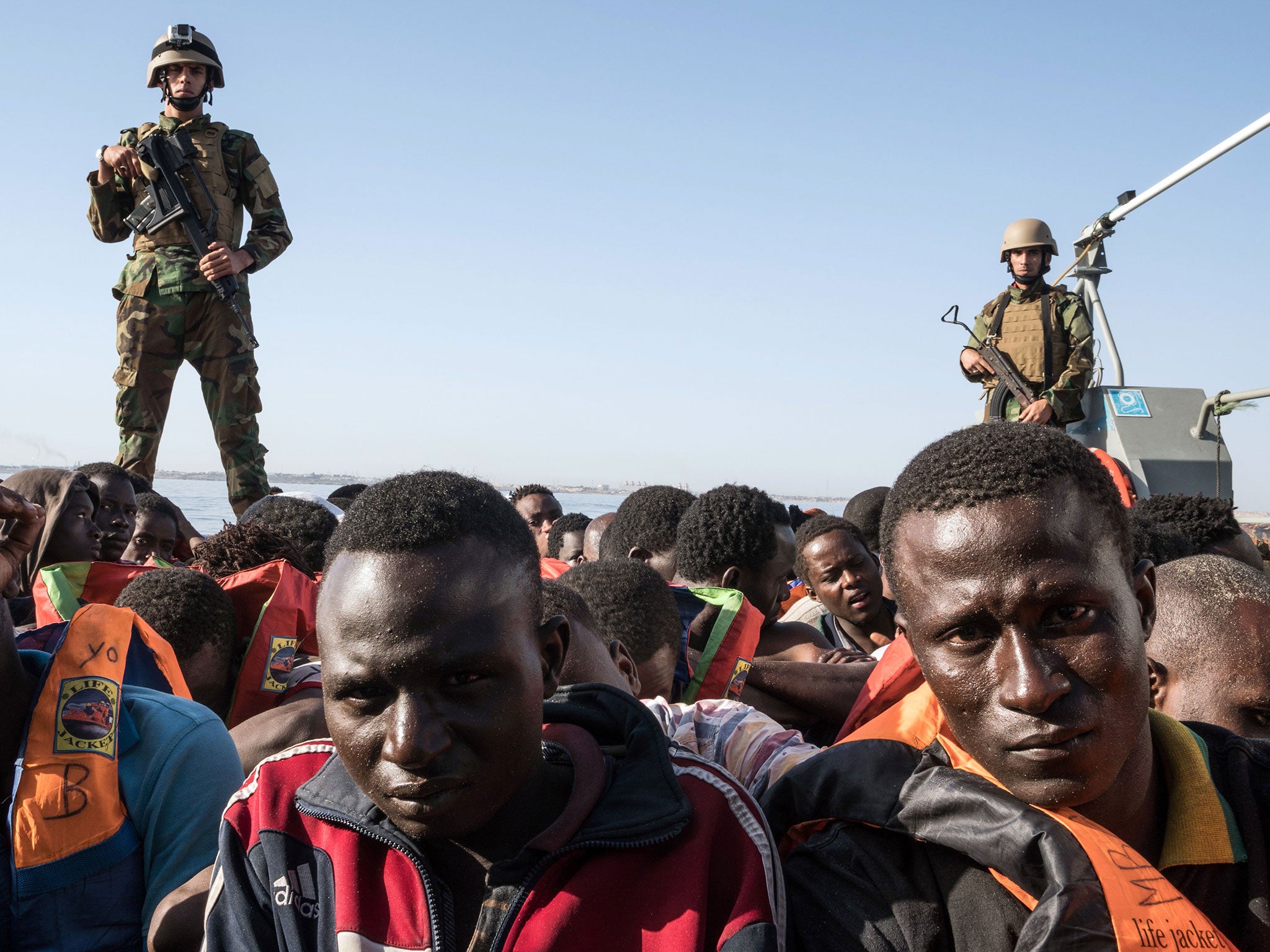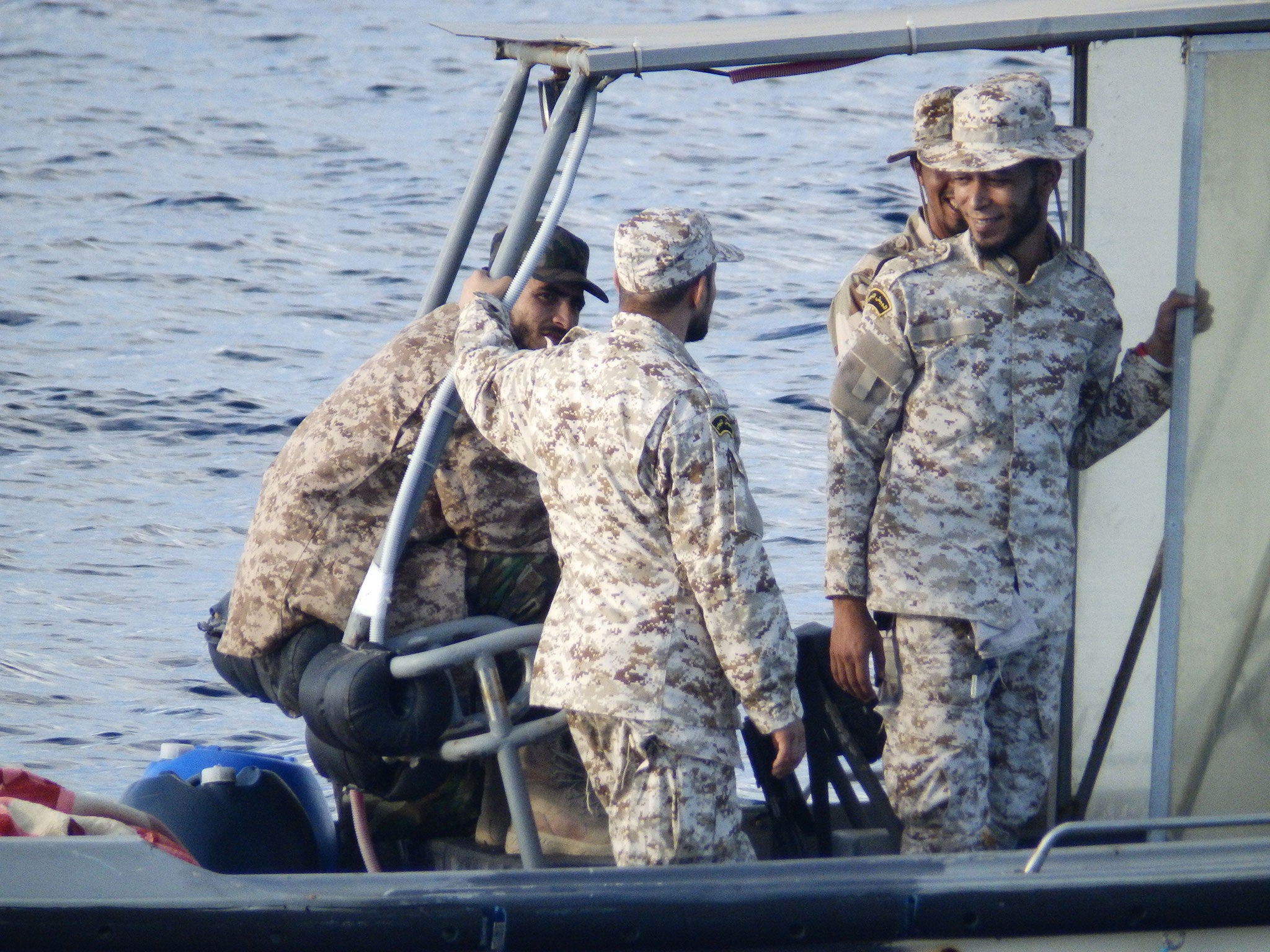UK-supported Libyan forces 'taking bribes to free detained migrants' after pushing boats back to shore
Exclusive: Migrants crossing Mediterranean Sea on second attempt after being pushed back and then released for payment

Your support helps us to tell the story
From reproductive rights to climate change to Big Tech, The Independent is on the ground when the story is developing. Whether it's investigating the financials of Elon Musk's pro-Trump PAC or producing our latest documentary, 'The A Word', which shines a light on the American women fighting for reproductive rights, we know how important it is to parse out the facts from the messaging.
At such a critical moment in US history, we need reporters on the ground. Your donation allows us to keep sending journalists to speak to both sides of the story.
The Independent is trusted by Americans across the entire political spectrum. And unlike many other quality news outlets, we choose not to lock Americans out of our reporting and analysis with paywalls. We believe quality journalism should be available to everyone, paid for by those who can afford it.
Your support makes all the difference.The UK-backed Libyan coastguard is running a racket in the Mediterranean Sea by turning its legitimate power to stop migrant crossings into a cash cow, according to victims’ accounts.
Guards allegedly stop smuggler vessels offshore and detain those onboard, before taking bribes to later release them. Migrants say they are then able to attempt another crossing to Europe.
Human Rights Watch (HRW) has collected numerous testimonies from migrants intercepted at sea who subsequently bribed their way out of Libyan detention centres. HRW says the accounts are tantamount to evidence EU funding could be exacerbating the refugee crisis it aims to fix.
Britain and other countries have been supporting the country’s coastguard with training and equipment despite heavily documented evidence of refugee abuse and even instances of violent clashes with aid vessels.
Stéphane, a 30-year-old man from Cameroon, told The Independent he was beaten and robbed by uniformed members of the force while attempting the treacherous boat crossing to Italy in June. This crossing had been organised by a Cameroonian smuggler.
“While they were beating us they demanded money, dollars, telephones – they took everything,” he said. “They claimed that if we gave them money, they would have taken us to Italy themselves.”
Stéphane and the other passengers were transferred to a prison near Sabratha, one of the biggest smuggling hubs in Libya, where he was kept for three weeks.
Migrants are supposed to be offered support to return to their countries of origin – but Stéphane was offered a different way out.
He said officials offered to free prisoners for €155 (£140) a head. With no money or possessions left after the first crossing, the bribe to release Stéphane and 56 other people was paid by the same Cameroonian smuggler who organised the initial crossing.
Stéphane was then taken to the same house he stayed in before his first crossing attempt, before boarding another smugglers’ dinghy and five days later being rescued and transferred to Sicily unchallenged.
The Independent met him at a rehabilitation centre run by Médecins Sans Frontières (MSF) for migrants with medical and psychological needs in Catania.
Stéphane told of horrific experiences in Libya, where he was kidnapped for ransom by two separate armed militias before attempting to flee to Italy, where he now hopes to complete his law studies.
His account is the latest in a series of allegations levelled at the Libyan coastguard, which has allegedly shot at humanitarian rescue ships, beat migrants and caused sinkings.
Despite credible evidence of abuses, the Ministry of Defence has embarked on a third round of training which started in October 2016, taking on 60 Libyan coastguard members in total.
Two rounds of programmes including human rights education have been completed offshore and in recent days a classroom-based course on maritime law, navigation and boat-handling has started at a military base in Italy.
Europe has steadily been increasing its cooperation with Libya’s fragile Government of National Accord (GNA), following the arrival of hundreds of thousands of migrants in crossings which have killed more than 15,000 men, women and children over the past four years.

The Government insists it carries out “robust assessments” on its partners, despite mounting evidence Libyan coastguard operations are both inhumane and ineffective.
Steve Valdez-Symonds, Amnesty UK’s director for refugee and migrant rights, said Stéphane’s story matched evidence of migrants being “passed from the coastguard to detention centres where they may be sold on to smugglers and others”.
He added: “There isn’t effectively a government to deal with in Libya but the EU is pursuing its obsession to stop people reaching Europe, regardless of the consequences.”
Mr Valdez-Symonds said the “chaotic” aftermath of Libya’s civil war, when the UK was among Nato members bombing Muammar Gaddafi’s forces before he was overthrown and killed, meant money was difficult to trace.
“You’ve got people in quasi-official positions like that of a coastguard who are probably not being paid regularly or properly supervised,” he warned. “Whether of their own initiative or as part of the operation they’re being directed in, these sort of abuses do seem to be pretty common.”
According to the International Organisation for Migration, there are between 700,000 and one million migrants in Libya, with between 5,000 and 6,000 of those in detention.
The flow over the Central Mediterranean has been relatively steady since 2014 but dipped temporarily over the summer amid suspicions militias had been paid to hold migrants back using money from the Italian interior ministry.
Judith Sunderland, the associate Europe director for Human Rights Watch, warned of an “overlap” between smugglers, armed groups and recognised authorities in Libya, which remains fractured between two rival governments and numerous militias.
“We are concerned about the violent, reckless, erratic behaviour of coastguard forces receiving support and equipment from Europe,” Ms Sunderland said.
“These are unreliable partners and a lot of evidence collected points to collusion between Libyan coastguard forces and smugglers.
“So there’s very clearly a danger that EU money, training and equipment is feeding a cycle contributing to further pain and suffering, and ultimately not serving its aims.”
Ms Sunderland said HRW had documented no substantial change either in the flow of refugees or conditions in Libya since EU training programmes started more than a year ago.
A Government spokesperson said the UK carries out robust assessments on all partners, including impact analysis and human rights compliance checks, before providing support in fragile states with poor human rights records.
“All our work considers possible risks to vulnerable migrants,” he added.
“In Libya, our support is saving lives, improving conditions and rights for migrants. The alternative would be to turn a blind eye to their suffering.”
A spokesperson for the GNA told The Independent: “The Libyan government takes these allegations very seriously. We have a zero tolerance for corruption in any instances and will investigate these very serious allegations before taking the appropriate action.
“We are doing our best, in the most difficult circumstances imaginable, to provide appropriate facilities for migrants onshore and protective measures of our coastline offshore. We are committed to fighting illegal human trafficking with our international partners.”